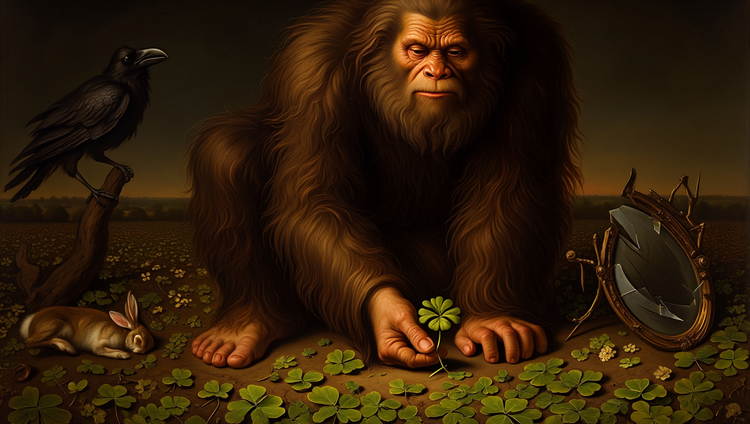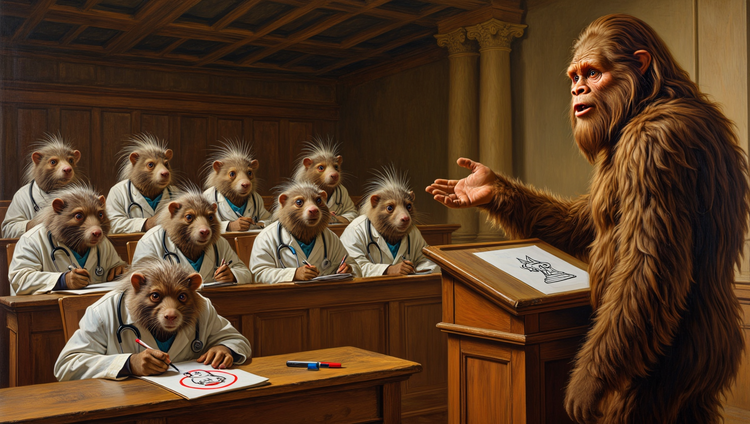New Yorker Rejects #7

Every now and then, an informal meeting of Portland-based, professional cartoonists takes place here in town. And I get an invite. It's not like it's an official thing, but it is mostly established New Yorker cartoonists. We sit at a bar and talk cartoons. It's lovely, and brutal, usually with moments of side-splitting laughter.
My neighbor, one of the cartoonists, let me tag along to my first meetup about a year ago. Shortly thereafter I submitted my first batch. I've been rejected 100% of the time since (including the ones below), but these cartoon-based hangs are still always one of the highlights of my month.
This may or may not seem strange, but our last one had a twist: we had an actual comedian with us. Someone who earns a living as a standup comic–which is incredibly difficult to do–was sitting there with us and trying to dissect our work.
He's also a friend of my neighbor's, and I guess he was interested. It actually makes perfect sense. Standup comedy and gag cartoons are completely within the same field of play, two routes that humor might take. Just like veterinary medicine and for-those-other-guys medicine.1
We're all want the laughs, we just get there in different ways.
Why this is relevant is a good question, and I'd be happy to answer that for if you'd just shut up for a second and keep reading.
Firstly, we're all comedy nerds, so we want understand the whole process better. This is exactly why these meetings can be brutal. You have to submit your precious work to in-person scrutiny (something lonely cartoonists are loathe to do). When one of your cartoons flops2 the group mercilessly pick it apart.
It's not out of contempt, it's out of curiosity. As any good coroner will tell you, digging around in something's guts is a good way to find out what killed it. It may not be pretty, but this is how you find out how to improve the health of the organism.
And healthy cartoons are funny cartoons. I'm a scientist, so naturally I favor an anatomic, almost reductionist view of humor. I'm not wholly opposed to there being a fundamental, even biologic principles of humor. Which is why I kept my mouth shut during a semi-dramatic scuffle between the guest comedian and a veteran cartoonist at our most recent meeting.
They were debating the merits of a specific "rule" of comedy, the particulars of which don't matter since it became clear that the punk rock-minded cartoonist was against any and all "rules" of comedy. Which, to be fair, the comedian wasn't insisting were as well fleshed out as, say... gravity or anything. But he argued, quite compellingly, that there are some mostly-reliable strategies you can use to improve the quality of your humor. Sort of like how there are no rules in love, but some generally-approved advice would be to look for something consensual.
My own take was that of course the whole thing must follow the Dobzhansky Principle, because it always is. And I certainly wasn't go to try to steer the whole group into a tangent on the neurophysiochemical path of humor known as incongruity theory. Even if I was thinking about it the whole time.
These meetings aren't necessarily about the why of cartoons (and definitely not in the evolutionary sense!), but more so about the how. We love them, so we want to make them better.
Anyway, here's my latest batch.
You know, it's weird submitting these things to The New Yorker. I just heard a podcast where they were saying that the magazine is in the Oval Office. That if you get published in it, the President of the United States is likely to read your cartoon. It kinda made me think about being a big shot, but then remembering that these are just silly jokes and taking them too seriously would be equivalent to creative death, I quickly retreated from any delusions of grandeur and tried to think about how it takes a bunch of people in the background to make anything work anyway.

Not that I'm opposed to making this a bigger part of my life (i.e. making vastly larger amounts of money from it, btw). It's just that if success does ever come knocking, well, how am I going to know what to expect?

I'm not even sure how much longer I can sustain this!

Seriously, it seems like my Uber driver is always driving a nicer car than me and pretty much stoked on their job, so maybe it's time to look into that.
Although I can't say the food delivery drivers always look so satisfied.

And I don't know, it might be me, not the career choice. I mean, there are always issues I'm going to have to deal with...

Plus, who knows how long this whole thing is going to last. Today might just be our hay day.

And if you caught that pun up there (hay!) and laughed, just know that professional humorists/cartoonists absolutely despise puns. And if you present one to them as though it's legitimately funny, you will be demoted to the most amateur ranking on the credible artist.
Which, even if you are an amateur, can still be tough!

Oh well, that's how we make it better. Maybe next time, New Yorker!
- There's even a podcast that covers all this, and you really should check it out (I'm on S3E4).
- Simultaneously the opposite of what you're trying to do and a genuine 95+% of what ends up happening.





Comments ()